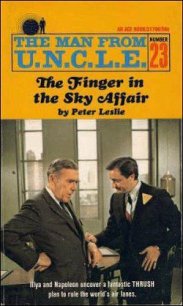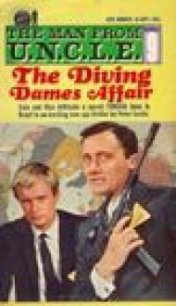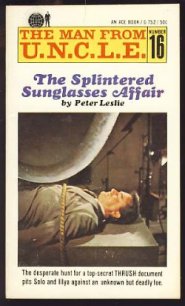The Unfair Fare Affair - Leslie Peter (читать онлайн полную книгу txt) 📗
"That would be impossible, Napoleon."
"I don't see why. I mean, if he has already told you—"
"It would be impossible because there isn't any organization."
"You're out of your mind! You just told me... you just said..."
"No—that's literally true. There's no organization. And our friends can hear no talk, no underworld gossip about the deal, because there is nobody to talk; incredible as it seems, Bartoluzzi is in it alone."
"You can't mean…?"
"The truth of the matter is, it's a one-man show!"
Chapter 14
The Retreat Of Illya
NAPOLEON SOLO'S characteristic low whistle of astonishment filtered clearly through the gauze of the miniature speaker. Holding the baton in the gloom of the old truck, Kuryakin raised a blond eyebrow in amusement.
"But that's unbelievable!" Solo's voice exclaimed. "Unbelievable!"
"True, nevertheless," the Russian replied soberly. "He's explained it all to me in the greatest detail, boasted about it. And although it seems incredible at first, you'll see when you think about it that it's the only sensible way to do the job, given the limitation that, necessarily, only a single job can be done at one time."
"Yes, but... it can't be true, Illya! I mean there are masses of other people involved. I know there are. Even in the few cases we know of. Take Waverly, for instance—there was the driver of the taxi, there was the ferryman, there were the three men in leather coats, to say nothing of the mysterious Willem and the missing crew member of his boat. Or take your own case; besides your driver, there are at least two—no, three!—others involved. The girl, the night watchman, and the genuine driver of the furniture van. There must have been a minimum of three men on Mathieu's dust cart to make the crew convincing. And there was the pilot of the plane to Corsica, too. So how can you say—"
"I said there's no organization as such," Kuryakin interrupted. "I said the organization, the network itself, was a one-man show. I didn't say nobody ever helped him."
"Then...?"
"But he never uses professional underworld help. There's no recognized gang. That's why there's no underworld gossip, as I said. He recruits his help from all over... and the extraordinary thing is, they have no idea what they are doing! None of them knows he is part of an escape organization carrying international crooks beyond the reach of justice!"
"How can that be?"
"He has invented clever and often involved reasons. He has painstakingly built up elaborate covers to account for the presence of the escapees. And the helpers never realize who they are!... The proprietors of the junkyards, for example, mostly think they are turning a blind eye to some minor racket involving the reregistering of stolen cars; those whose yards are near frontiers think they are being paid to help with the smuggling of a few bottles of liquor or a few cases of cigarettes in an untraceable vehicle; the helpers on each side of the Iron Curtain believe they are assisting political refugees. The plane to Corsica would have been no problem because Bartoluzzi himself is a Corsican, and so was Mathieu."
"And Waverly's little lot? If I remember rightly, they spoke of a series of people using that route. Doesn't that sound professional?"
"It is professional. But they still don't know. Bartoluzzi was using an existing network there. The Minerva was probably his own, but the rest of the routine belonged to an ultraright-wing group that occupies itself with clandestinely returning ex-Nazis to Germany, using a few of the more venal Dutch for additional staff on the way. I expect he offered to contribute handsomely to their funds if they would allow him to use their facilities this once. From Denmark, it was very convenient, you see."
"Remarkable!" Solo said admiringly. "I suppose it's just possible. If he planned very carefully and spaced out his clients right, choosing only those he knew he could handle, he could dodge around doing one after the other, rather like a tramp steamer taking cargo from port to port as it goes along."
"Exactly. And as an ex-haulage man, he's known to a lot of the people along the route anyway. Half the customs and immigration personnel at the frontiers seem to be old friends for a start!"
"And this, no doubt, is why nobody knew how to get in touch with the organization in the underworld, why nobody ever knew if they were acceptable as clients until he contacted them—there was nobody to contact unless he himself happened to be in the area; and he'd make contact only if he thought the case was worthwhile and if it worked in with his other commitments geographically."
"Exactly," Illya said again, peering through the crack he bad left between the rusty back doors of the truck. "Napoleon, I have to go now—I can see Bartoluzzi through the trees. He's coming back with the food."
"Okay," Solo's voice said cheerfully. "I'll listen again around nine. In the meantime... bon appetit!"
Bartoluzzi had produced—from heaven knew what secret source!—a large, round peasant loaf, a carton of hot sauerkraut with four huge wursts, a great wedge of Emmenthaler cheese, and two bottles of Schluck.
As he poured the wine, he told Illya of what he had discovered at the back doors of the little town—speaking in the bragger's third person so often adopted by monomaniacs. "Bartoluzzi saw," he said, "in the local newspaper that they have suspected your getaway from Paris. He has been cunning enough to have got you thus far without them once seeing you. But he has to be careful. Bartoluzzi must use all his skills, for the paper says that they suspect you are heading southwest. They suspect!" He laughed contemptuously. "They will need more than suspicion to match the guile of Bartoluzzi!"
In his turn, Illya laughed too. He elbowed the door open and spat realistically into the night. "I'd like to see the frontier guards who could stop me getting through once I'd made my mind up!" he rasped.
"Fortunately, the question will not arise. Bartoluzzi has arranged all so that no guard will see you."
"Bartoluzzi arranges things well; he has a talent for it," Illya said in a conciliatory tone. (The style of speech was catching!) "But tell me—such things cannot be arranged in a day. It takes time to organize. Bartoluzzi could not do all this without planning. Even I could not. Tell me... how did this thing begin?"
Over the outthrust of the huge chin, eyes gleamed in the dusk. "To many, I would say, 'Mind your business.' But you are a man. You have done things such as a man might do…" He paused, swallowed the remainder of a mouthful of sausage, and shot the Russian a glance before he continued.
"I will tell you. I was born in a small village near Venaco, right in the center of Corsica. My family was very poor. They never took vacations or left the village. But sometimes, once every two or three years, I was asked by the local cure to go with other children to the coast, to see the sea. We would get in an old bus and go for the day to Aleria, to Folelli, or even perhaps to Corso, near the Capo Russo—the red cape. It was very beautiful. And all the time I was a child I wanted nothing more than to be near the sea all the time.
"I would have liked to be a fisherman or to work on the boats that went from Bastia and Ajaccio to Nice and Marseille. But for people like us it was impossible. One had to work all day long on the land to get enough to eat. And so as a young man I became just another peasant in the mountains. But I never forgot the sea. Always in my heart I wanted to live beside it—to see the sun rise over the horizon, to watch how the colors changed all the day long, to listen to the fury of the waves in the wintertime. And then, when my parents died, I went to the coast, but I could get no work. And so I stowed away on a boat and I got to Marseille. But still I could not get work on the sea—I had no experience, I did not know the right people. All I could manage was to work as a mate on the poids lourds, the huge transport trucks that went between Marseille and the north.




